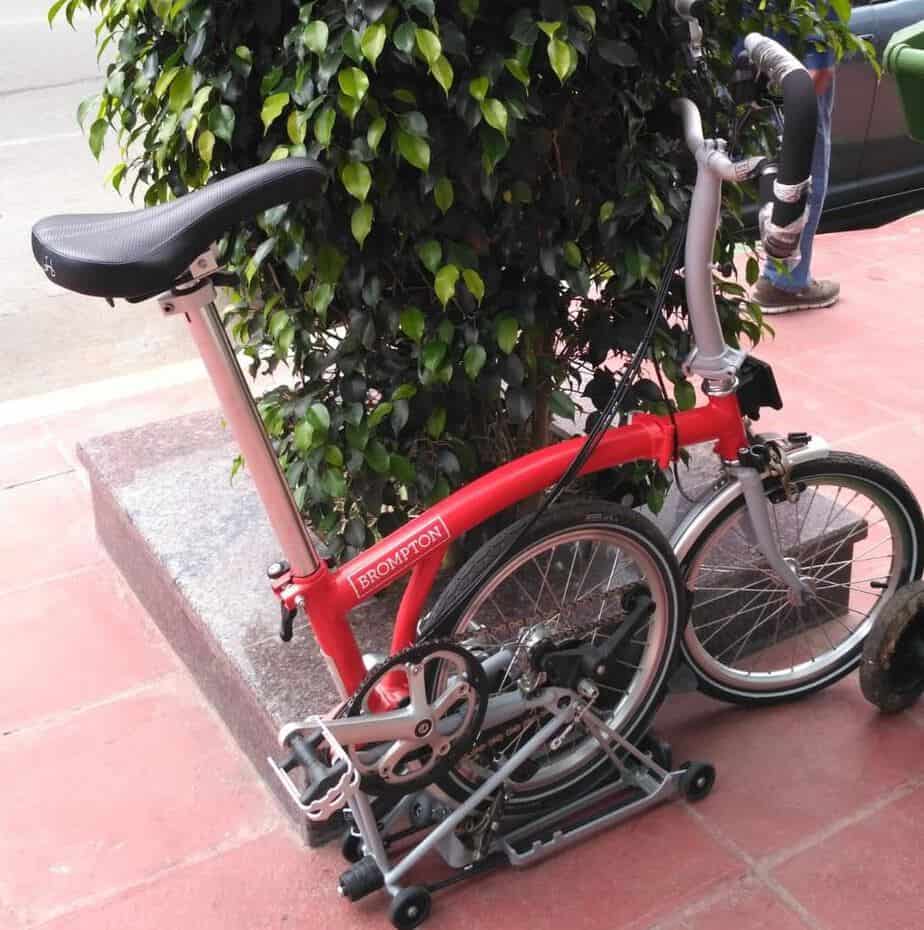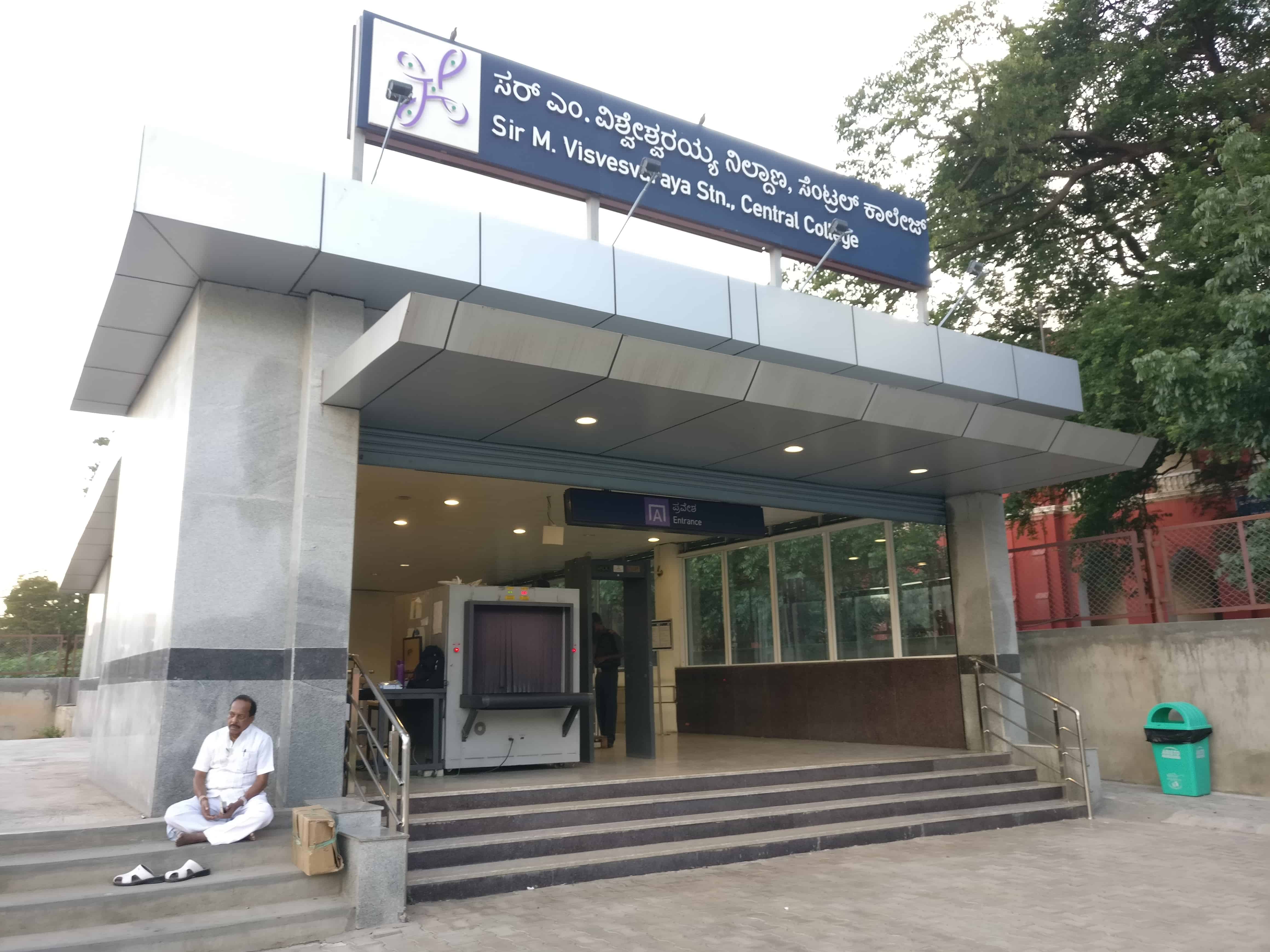In July, the Bangalore Metro Rail Corporation Ltd (BMRCL) formally acknowledged that ‘foldable bicycles’ were welcome in the Metro. But its blanket rule on baggage fees has dampened the spirits of commuters who use cycles for last-mile connectivity.
The baggage rule implies that a commuter would have to pay Rs 30 every time he boards the Metro with his cycle. This fee may even be higher that the commuter’s own ticket cost. Despite BMRCL’s avowed support for cycling, it’s unwilling to exempt cycles from baggage fee.
Rs 30 for excess baggage
Since the Metro started operating in 2011, BMRCL had introduced a fee of Rs 30 apiece for excess baggage, but fee collection was not stringent. This August, the corporation streamlined baggage fee collection across Metro stations in the city. Under the new system, security personnel paste a sticker on baggage that exceeds specifications, and then staff at the counter issue a ticket. In August, BMRCL collected Rs 2.9 lakh by issuing 9816 luggage tickets. This was twice the number of baggage tickets issued in April.
According to BMRCL Chief Public Relations Officer B L Yeshwanth Chavan, the corporation is allowed to charge any baggage (except handbags) that weighs more than 15 kg or exceeds the dimension of 60 cm x 45 cm x 25 cm. Baggage that exceeds the specified dimension cannot pass through the scanner.
“But an average foldable bicycle is approximately 75 cm long upon folding. These are spotted and stopped at the security gates and the baggage fee is applied on these, which is unfair,” says Rajeev Malagi, a cycle commuter and Senior Associate at WRI India Sustainable Cities.

Cyclists say that an average foldable bike is about 75 cm long when folded, and does not pass through scanners. Pic: Sameer Shisodia
Cyclists say there’s constant friction between them and security personnel due to the lack of clarity on the rule. “It’s a pure waste of 15-20 minutes, convincing the security personnel that bicycles are allowed on the Metro. Unless they are rational and patient, baggage fee is generally slapped on bicycle users,” Kiran Kumar, another cyclist, says.
Cycles have to pass through scanner, else fee levied
BMRCL has always maintained that it allows foldable bicycles, but this was based on an informal agreement between the cyclist, BMRCL and security personnel. On many occasions, there were disputes between security guards and cyclists on the issue.
After a discussion initiated by cyclists, BMRCL formally acknowledged their concern in mid-July this year. BMRCL said it has categorically instructed the security to allow foldable cycles through the gate. To avoid inconvenience to other passengers, cyclists could travel in the last coach of the Metro that has reserved space for both cycles and wheelchair occupants. However, the foldable cycle still had to pass through the baggage scanner, which remains the bone of contention between cyclists and authorities.

Foldable cycles often don’t pass through scanners at Metro stations. File pic
Cyclists say that even the baggage scanning machines are inconsistent. Satya alleges that, given baggage-screening technology was procured at different phases, the size that baggage scanners can accommodate is different in different Metro stations.
Recounting his ordeal, city-based bicyclist Avinash Krishnamurthy says that his foldable bicycle passes through the X-ray machine at MG Road Metro station, but not at the RV Road station. “The lapse is because of the differences in the sizes of the X-Ray machine. I explained this to the security staff at RV Road station, and showed them the entries I had made in their log book earlier. Only then was I allowed to take my cycle,” he says.
Recently there was a change in the staff manning the scanner at RV Road station again, and Avinash was asked to pay the additional charge for the cycle. “There should be a long-term institutional solution for all bicycle commuters, and not just for some who are known to the staff due to travel frequency or personal acquaintance,” he says.
Cycling advocates argue that the dimension of cycles shouldn’t be a barrier for entry to the Metro. Bengaluru’s Bicycle Mayor Sathya Sankaran says that across the globe, rapid transit systems generally encourage cyclists to carry their personalised mode of transport. Bengaluru currently has over 82 lakh registered vehicles, majority of which are private two-wheelers and cars. And the average traffic speed in the city is only 18.7 km per hour, as per the ‘Travel Time Report Q1 2019 vs Q1 2018′, released by the office commute platform MoveInSync Technology Solutions recently.
“It is not just speed we are talking about, but how ecologically friendly bicycles are as a mode of transport. There has to be more incentive for bicycle commuters who are voluntarily promoting the use of mass transit, and at the same time conserving ecology,” Malagi says.
In addition to saving road space and reducing pollution, cycling is also financially feasible. While users of cabs and public transport have recurring expenses, cyclists tend to recover their investment in the cycle (estimated at Rs 15,000) in less than a year-and-half, even if they commute only about thrice a week, says Malagi, based on his own experience.
Cannot exempt cycles specifically, says BMRCL
Chavan says that security personnel don’t leave anything at stake during baggage screening for security reasons and due to communication gap at times. The scanners are mostly manned by the personnel of City Armed Reserve, District Armed Reserve and Karnataka State Reserve police forces on rotational basis. And these personnel follow their own rules with respect to security.
BMRCL is in talks with the state police to get dedicated manpower to manage its assets and facilities. With this, it hopes to have more uniformity in the communication and implementation of its rules. This could lead to security personnel having a more positive attitude towards allowing cycles, says Chavan.
However, BMRCL is unlikely to issue a specific directive exempting foldable cycles from baggage scanning. A senior BMRCL official says, on condition of anonymity, that charging baggage fee on account of the weight or size of the object is an established practice even in other Metros such as Delhi, Mumbai and Hyderabad.
“We also have to take into account the convenience of other travellers. What if someone comes out with a luxury or oversized bicycle tomorrow and demands entry to the Metro? It will be difficult to make an argument. Therefore, we have prescribed that on minimum, any additional equipment must fit the baggage-screening device,” he says. Nevertheless, BMRCL authorities have assured cyclists that they will look into the matter.
Meanwhile, cycling advocates have urged authorities to have a signage or display at the security gates informing both security staff and passengers that bicycles are allowed. “We will propose to the BMRCL that we ourselves can procure such stickers and put them up at security gates. We are going to meet BMRCL soon on this,” Satya says.
Cyclists have also urged authorities to at least issue a digitised sticker or ID card for their cycle on one-time or renewal basis. They say the sticker/ID can then be shown at the security desk so as to bypass hurdles with least inconvenience to all the stakeholders. “There are hundreds of innocent cyclists commuting throughout the city. They are demotivated from carrying their ride if security agencies hassle them each time,” Satya says.
Further, activists also plan to urge BMRCL not to levy Rs 30 per day as parking fee for bicycles. “As it is, the number of bicycles are few, and they don’t consume much space. There are people who travel in bicycles due to financial reasons. If the charges are waived off, it will encourage more people to use bicycles,” he says.
Thats not encouraging people to cycle, infact its discouraging them. 30 bucks a day is exceedingly expensive and I dont think is done anywhere else in the world.
Cyclists generally have no decorum on traffic rules. They choose to ride on footpaths and do not obey traffic signals. The metro is already packed to the core at most hours. I think the authorities are right to levy additional fares on baggage that occupy additional space and cause inconvenience to other commuters.
Well traffic is very unfriendly to cyclists. I’ve been honked at by even a police car on a Sunday morning when I was at the left of the road riding slowly. If traffic was more friendly cyclists would not bother pedestrians.
Footpath is the right place to ride cycle. Since cycles go very slow, all over world footpath is the place for cycling.
This is why , India is a Banana Republic , because of its people like this. The authorities has to learn to improve. Don’t you know there are many countries in the world which has cycle track in the road itself?
Same with two wheelers and cars who drive on footpaths as if they were bypass roads and do not even care about pedestrians. They are also not fined for such act which is very unfair!!
They have fewer than 50 stations in all, yet they are not able to educate the personnel on what is allowed and what is not, allowing bike inside the train is a very good idea if you wanna copy Newyork subway system, but let us not forget during peak hours #nammametro focuses more on stuffing max number of people in a train to maximize the profit rather than thinking about the bare minimum comfort of the commuter
BMRCL’s intention is to fill the metro car with people like hell. So no question of bicycle. We just replicated the foreign transport system but dont know how to operate/maintain it. Objective here is to earn profit but not to provide good commutation system.
Europe and many other nations have switched to ebikes for their daily commute to office. In India, it is sad that a cyclist is not at all respected anywhere on the street. Common fit India, this is such a big shame on us, especially when the world is fighting against fossil fuels, pollution and other hazards these days!!
Is Folding electric bicycle allowed? Curious because it contains batteries and electronics. Can anybody confirm this?